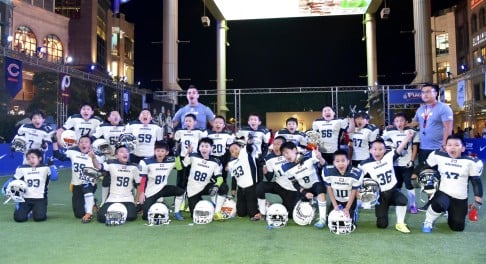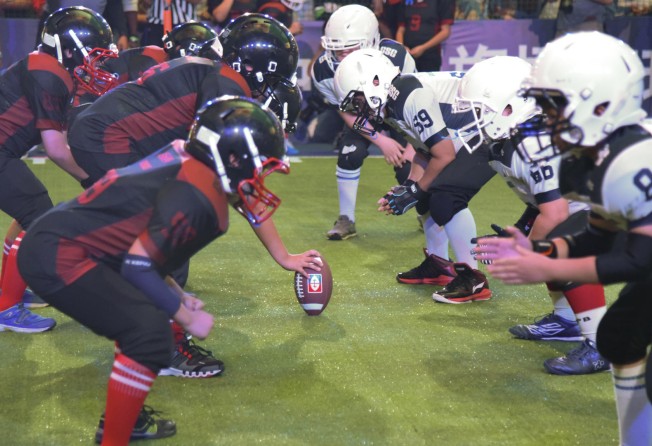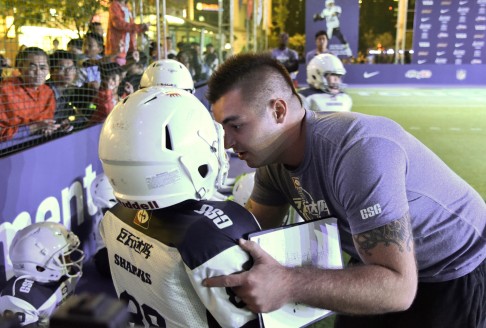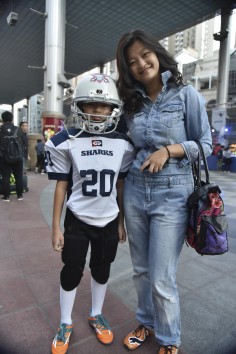
How American football is taking on China challenge - and winning
Gridiron is gaining ground in China as parents turn to the sport to help their youngsters develop character and self-reliance

From the sidelines of a makeshift football field, set up on the weekend near a Beijing shopping mall, fans are yelling encouragement as the players take up their positions under the floodlights.
"Go, Sharks, go."
The two teams squaring off are the Sharks and Vipers, made up mostly of primary school pupils aged between six and 10 years old. "Grab the ball and hold on to it," a middle-aged man, recording the play with a camera, shouts to a broad-shouldered snapper.
Unlike basketball, which has a long history in China (the game was introduced by Christian missionaries in early 1900s and is now played by some 300 million people in the country), most Chinese know little about American football.
But its popularity has been growing in recent years, says Shen Yu, marketing director for Great Stone Gridiron, an American football club established in Beijing three years ago. (According to the Gridiron Leaders Foundation, the number of football teams in China has grown more than 10 times from three in 2012 to 36 in 2014.)

Businessman Jin Xin set up Great Stone Gridiron with two friends to promote his favourite sport. Jin, 32, went to the US in the early 1990s as a teenager and played football all through high school in Georgia. Back in China after completing his business degree, he was keen to see others appreciate the game.
"I told my friends, who are both sport fanatics, that I wanted to set up an American football school for young kids because I believe that's the way to promote this sport and it's very important to cultivate that zeal at an early age," he says.
Between them the friends have invested about 1.5 million yuan (HK$1.82 million) on the club, which offers programmes of varying intensity with fees averaging at about 15,000 yuan for 100 hours of training.
Many parents come here seeking a way to make their boys become more self-assertive or manly
Parents enrol their children a couple of hours a week initially, but some boys are so keen they even sign up for 500 level courses, which means they will keep learning to play American football for the next five years, Shen says.
"Most of these children enjoy playing out of true interest and the [sport] helps them grow up to be outgoing yet disciplined young men."
The youngsters' embrace of this high-contact sport may seem a little at odds with the tendency of some families in China to be overprotective of their one child. Despite sometimes jolting collisions as players try to clear a path for the ball carrier, everyone is keen to make their mark on the field.
Among the dozen benchwarmers is 10-year-old Wang Baozhi, who is nursing a sore ankle, dried tears marking two distinct tracks down his little face. "It hurts a lot," Baozhi murmurs through his blue mouthguard. "But this is not new; I've injured my right ankle before."

His American coach, Wes de Kirby, hunkers down in front of the boy, trying to give him a pep talk.
Great Stone employs a mixture of Chinese and Americans coaches, and training sessions alternate between Putonghua and English. Americans account for about one third of the coaches, with some former players such as De Kirby, whose chronic injuries ended his dream of joining the college team at the University of California, Berkeley.
A major reason why Chinese parents are increasingly interested in sending their little boys to the American football club is to help them develop character and self-reliance, Shen says. "Many parents come here seeking a way to make their boys become more self-assertive or manly."
Many children come to Great Stone club without even knowing what a touchdown means, so the coaches are mostly starting from scratch and must teach their young charges everything from the concepts of the game to basic techniques such as bumping a receiver and learning to backpedal from the line of scrimmage and the finer points of running plays.

Perhaps no one knows better about the transformation playing football has made in young Bowen than his mother, Geng Yingmei.
"It's amazing to see my son become more outgoing now. Previously, he would not say a single word to anyone he hadn't met before," she says. "Now you can see almost all his friends here at the football school are quite cheerful and show some manly traits."
Changing her son's disposition, however, has not come easy. Bowen has suffered several minor injuries to his ankles and elbow but luckily no broken bones. And he was struggling hard to hold back his tears the first few times he got hurt, Geng recalls, her son squirming at her revelations.
Now an enthusiastic convert to the sport, Geng believes American football is not as risky and violent as most Chinese people think and that serious injuries can be avoided through proper training.
"When we Chinese talk about it, it's all about fierce blocks and danger, but this is not true."
Such shifts in perception and the sport's burgeoning popularity in China are driven in no small way by the focused efforts of the Chinese division of the National Football League (NFL), one of the four major professional sports leagues in North America.
Just as the NBA has worked hard to tap the China market for American professional basketball, the NFL hopes to cultivate a similar fan base in China.
Besides presenting highlights of US games via online channels and traditional free-to-air television stations, the NFL has established a growing presence on social media, including platforms such as Weibo and WeChat, which have each attracted hundreds of thousands of followers.
Although American football is still a niche sport in China, a survey by the NFL found that its fan base has ballooned from just 1.6 million people in 2010 to some 17.7 million last year - a more than tenfold increase.
All sports can teach children something, but nothing teaches them as holistically as American football - interdependence, teamwork and how to give a hit and not be angry
"Our target demography are people aged between 16 and 26 living in Beijing, Shanghai, Guangzhou and other top-tier cities. They are very interested in new things, like their watch or their car. And it's the same about their choices of sport," says Richard Young, managing director of NFL in China. "People who fall into this age group are really cultural explorers."
Young dismisses the notion that cultural differences are too great for American football to take hold in China.
"China is a diverse country and when it comes to good sport, cultural differences are not as nearly as divisive."
Recalling his experiences in China in the 1990s, he says Chinese friends told him at the time that people in China would not like drinking coffee.
"And yes it seems that coffee may never overtake tea, and [American football] may never overtake soccer or basketball; but that doesn't mean Starbucks won't have a good business here," he says. "In fact, when people invest their free time into a sport, all sports can have great moment; there's no question about it."
Perhaps not surprisingly, Young believes American football is the sport that can contribute the most to building character in young people.
"All sports can teach children something, but nothing teaches them as holistically as American football - interdependence, teamwork and how to give a hit and not be angry," he says. It delivers such lessons on a constant basis with depth and complexity; unlike basketball "you know there is no Michael Jordan who can run down the court and shoot the ball 15 times and either win or lose the game", he adds.
The young players at Great Stone Gridiron seem to have taken this lesson to heart, relying on individual grit and teamwork to tackle, punt and just advance the ball down the 20-yard line. If it doesn't work, you just huddle up, discuss and change plans.
After about 90 minutes, the whistle blows and the drizzly Friday night game wraps up with a loud hurrah and with the Vipers ultimately losing to the Sharks, 16-9.